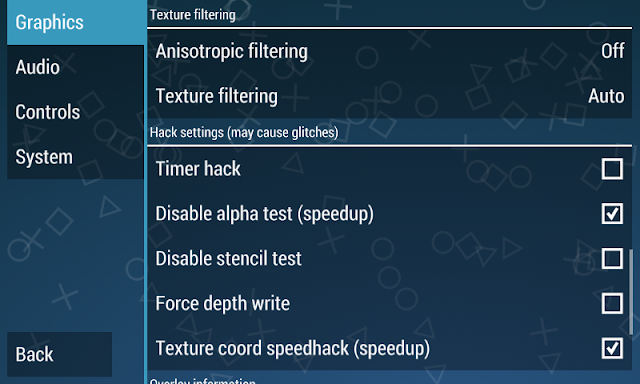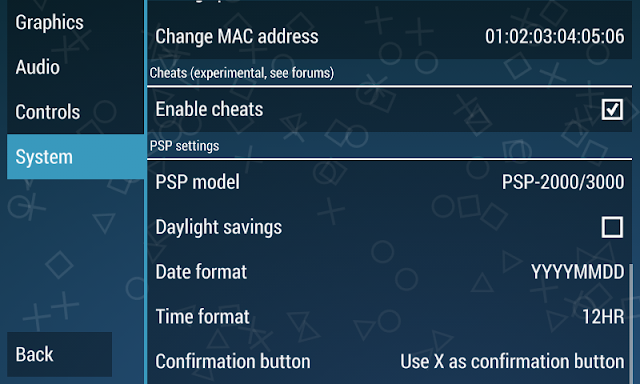Download PPSSPP v0.9.9 PC Full Setting
Download PPSSPP v0.9.9 PC Full Setting
PPSSPP is a PSP emulator written in C++. It translates PSP CPU instructions directly into optimized x86, x64 and ARM machine code, using JIT recompilers (dynarecs).
PPSSPP can thus run on quite low-spec hardware, including stronger ARM-based phones and tablets, as long as there's OpenGL ES 2.0 support......
About PPSSPP
PPSSPP is a PSP emulator written in C++. It translates PSP CPU instructions directly into optimized x86, x64 and ARM machine code, using JIT recompilers (dynarecs).
PPSSPP can thus run on quite low-spec hardware, including stronger ARM-based phones and tablets, as long as there's OpenGL ES 2.0 support.
Code and commit access
PPSSPP is an open source project, licensed under the GPL 2.0 (or later). Anyone is welcome to contribute their improvements to the code. The code is hosted at the Github page for PPSSPP, using the Git source control system.
Following the Dolphin tradition, the PPSSPP project is very open. Anyone can participate directly in the development by making pull requests, and if you make substantial contributions you may be given rights to commit directly.
Building
Android
You can build for Android from Windows, MacOSX or Linux.
To build for Android, make sure that you have installed the Android SDK and NDK correctly, and that the $NDK environment variable is set to the path of the NDK.
Go to ppsspp/android in a command prompt and run either ab.cmd or ab.sh, depending on your operating system.
Open the project in Eclipse (Impor it into your workspace, also import the "native" project and set up an Android library dependency from PPSSPP to native)
Build and run on your phone. If you rebuild the NDK part, you may have to add a space to PPSSPPActivity.java or refresh the project to force Eclipse to push out a new APK to your device.
Debugging and logging
You'll find yourself relying on the logs a lot to figure out what's really going on. As PPSSPP simulates the PSP OS, we get something similar to a Unix-style strace.
There's a headless (no display/audio) build, which is very useful when running the pspautotests through test.py - highly recommended way to find issues.
The Windows port and the Qt build have interactive debuggers (Qt currently broken). This is not available for mobile platforms and "SDL" builds.
HLE
PPSSPP is a HLE ("high level emulation") emulator, it simulates the PSP OS as seen by the game rather than the full hardware. A program running on the PSP OS can send raw display lists to the graphics chips, but can't access the flash controller or the Media Engine directly, instead it has to go through libraries and the PSP OS kernel. We simply simulate these. This is a lot of work though, the PSP OS is large and has plenty of functionality so achieving 100% compatibility is difficult bordering on the impossible. We can get close though.
Automated Test Suite
Since this emulator implements most of the PSP OS in order to run games, testing it against the real thing is critical. Some other PSP emulator authors have collaborated around creating a test suite called pspautotest, and we have picked that up and expanded it. There are two scripts: test.py and gentest.py. gentest.py uses psplink to run a test program on your real PSP and captures the text output and saves it as [test].expected. Then you can run the same test in PPSSPP by using test.py, which will automatically compare the output to the expected output.
Dependencies
PPSSPP has few dependencies: basically zlib and OpenGL, and its own fork of FFMPEG. It mostly sticks to the OpenGL ES 2.0 subset of OpenGL. It also includes a few minor libraries like CityHash and libzip directly in the distribution, for ease of building on Windows.
Contributing
Pick from the list of tasks below, go look at the open issues on GitHub, or just implement whatever missing feature you feel like. Send your code as a pull request on Github. If you send a couple of good pull requests, you'll be added as a contributor and get your own commit access.
Porting
The PPSSPP coding style is similar to the Google C++ coding style.
PPSSPP is a PSP emulator written in C++. It translates PSP CPU instructions directly into optimized x86, x64 and ARM machine code, using JIT recompilers (dynarecs).
PPSSPP can thus run on quite low-spec hardware, including stronger ARM-based phones and tablets, as long as there's OpenGL ES 2.0 support.
Code and commit access
PPSSPP is an open source project, licensed under the GPL 2.0 (or later). Anyone is welcome to contribute their improvements to the code. The code is hosted at the Github page for PPSSPP, using the Git source control system.
Following the Dolphin tradition, the PPSSPP project is very open. Anyone can participate directly in the development by making pull requests, and if you make substantial contributions you may be given rights to commit directly.
Building
Android
You can build for Android from Windows, MacOSX or Linux.
To build for Android, make sure that you have installed the Android SDK and NDK correctly, and that the $NDK environment variable is set to the path of the NDK.
Go to ppsspp/android in a command prompt and run either ab.cmd or ab.sh, depending on your operating system.
Open the project in Eclipse (Impor it into your workspace, also import the "native" project and set up an Android library dependency from PPSSPP to native)
Build and run on your phone. If you rebuild the NDK part, you may have to add a space to PPSSPPActivity.java or refresh the project to force Eclipse to push out a new APK to your device.
Debugging and logging
You'll find yourself relying on the logs a lot to figure out what's really going on. As PPSSPP simulates the PSP OS, we get something similar to a Unix-style strace.
There's a headless (no display/audio) build, which is very useful when running the pspautotests through test.py - highly recommended way to find issues.
The Windows port and the Qt build have interactive debuggers (Qt currently broken). This is not available for mobile platforms and "SDL" builds.
HLE
PPSSPP is a HLE ("high level emulation") emulator, it simulates the PSP OS as seen by the game rather than the full hardware. A program running on the PSP OS can send raw display lists to the graphics chips, but can't access the flash controller or the Media Engine directly, instead it has to go through libraries and the PSP OS kernel. We simply simulate these. This is a lot of work though, the PSP OS is large and has plenty of functionality so achieving 100% compatibility is difficult bordering on the impossible. We can get close though.
Automated Test Suite
Since this emulator implements most of the PSP OS in order to run games, testing it against the real thing is critical. Some other PSP emulator authors have collaborated around creating a test suite called pspautotest, and we have picked that up and expanded it. There are two scripts: test.py and gentest.py. gentest.py uses psplink to run a test program on your real PSP and captures the text output and saves it as [test].expected. Then you can run the same test in PPSSPP by using test.py, which will automatically compare the output to the expected output.
Dependencies
PPSSPP has few dependencies: basically zlib and OpenGL, and its own fork of FFMPEG. It mostly sticks to the OpenGL ES 2.0 subset of OpenGL. It also includes a few minor libraries like CityHash and libzip directly in the distribution, for ease of building on Windows.
Contributing
Pick from the list of tasks below, go look at the open issues on GitHub, or just implement whatever missing feature you feel like. Send your code as a pull request on Github. If you send a couple of good pull requests, you'll be added as a contributor and get your own commit access.
Porting
The PPSSPP coding style is similar to the Google C++ coding style.












0 komentar:
Posting Komentar